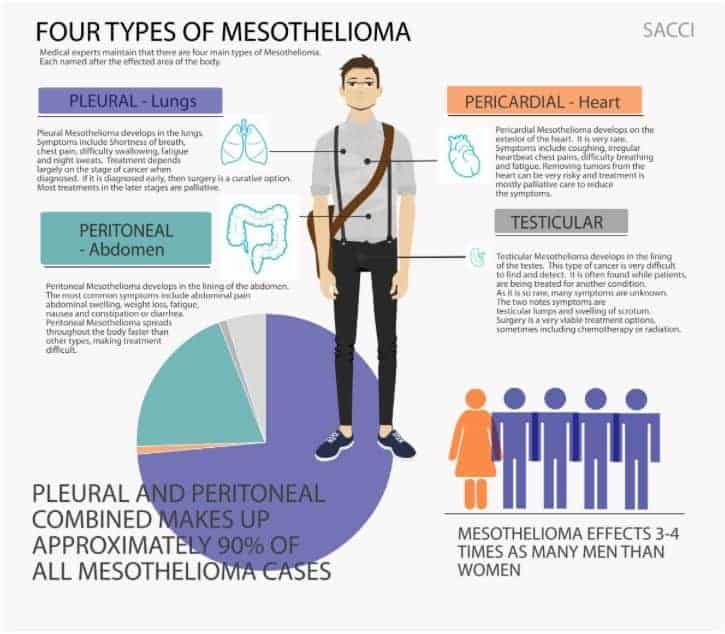Types of Mesothelioma
Mesothelioma, a disease that is caused by extended exposure to asbestos, has four types. This disease is diagnosed by a doctor and usually the patient can remember a time when they were exposed to asbestos. The four types of mesothelioma are testicular, pleural, peritoneal, and pericardial.
Related: Mesothelioma Symptoms | Early Detection of Asbestos Cancer
Testicular Mesothelioma
This rare mesothelioma occurs in less than 1% of mesothelioma patients. It is in the lining of the testes and is usually discovered when the patient is undergoing treatment for an unrelated condition. Painless lumps will develop, and the presence of these along with scrotum swelling will lead to a diagnosis. Surgery is required to removed the affected area and some doctors will recommend either chemotherapy or radiation afterwards.
Pleural Mesothelioma
Breathing in asbestos causes pleural mesothelioma – the most common form of this disease. The lining of the lungs is affected and the patient will suffer from symptoms including chest pain, dry cough, shortness of breath, and fatigue, among others. Early stage pleural mesothelioma has some treatment options, while later stages will only receive palliative care. It's hard to diagnose this form of mesothelioma, because early stages tend to have symptoms that are easy to ignore. It's not until the disease has really progressed that the symptoms become more obvious and diagnosing it is easier.
Related: Important Information about Mesothelioma Prognosis
Peritoneal Mesothelioma
The second most common form of mesothelioma, is peritoneal mesothelioma – where the lining of the abdomen is affected. Symptoms include fatigue, weight loss, nausea, vomiting, and abdominal swelling, among others. This form of mesothelioma tends to spread quickly through the body, making treatment difficult. There is a form of treatment that has some promise – heated chemotherapy. Unfortunately, there is no way to know how each individual patient will react to this form of chemotherapy, and outcomes will vary from person to person.
Pericardial Mesothelioma
This rare form of mesothelioma occurs when the exterior lining of the heart is affected. Fluid will build up in between the layers of the lining causing symptoms such as coughing, chest pain, and an irregular heartbeat. Surgery is usually not an option since it is so close to the heart, and patients are usually treated with palliative care to make them as comfortable as possible. The symptoms of pericardial mesothelioma can mimic a heart attack, making it even harder to diagnose.

Malignant vs. Benign
Of the different types of mesothelioma, most forms of mesothelioma are malignant, meaning that if they are caught early enough, they will need to be treated aggressively in order to give the patient a chance at survival. If they're not caught early enough for treatment then there are not many treatment options. There is one form of mesothelioma, well-differentiated papillary mesothelioma, that is generally considered to be benign. It's much easier to treat and usually has a better outcome than a malignant form of mesothelioma.
No matter the symptoms, each type of mesothelioma can only be diagnosed by a medical professional. Determining the cell type through a biopsy is the way to learn more about each patient and their individual disease. The tumors will be made up of cells, and each cell can have subtypes that the pathologist will need to uncover.
Related: Facts About Mesothelioma Diagnosis



